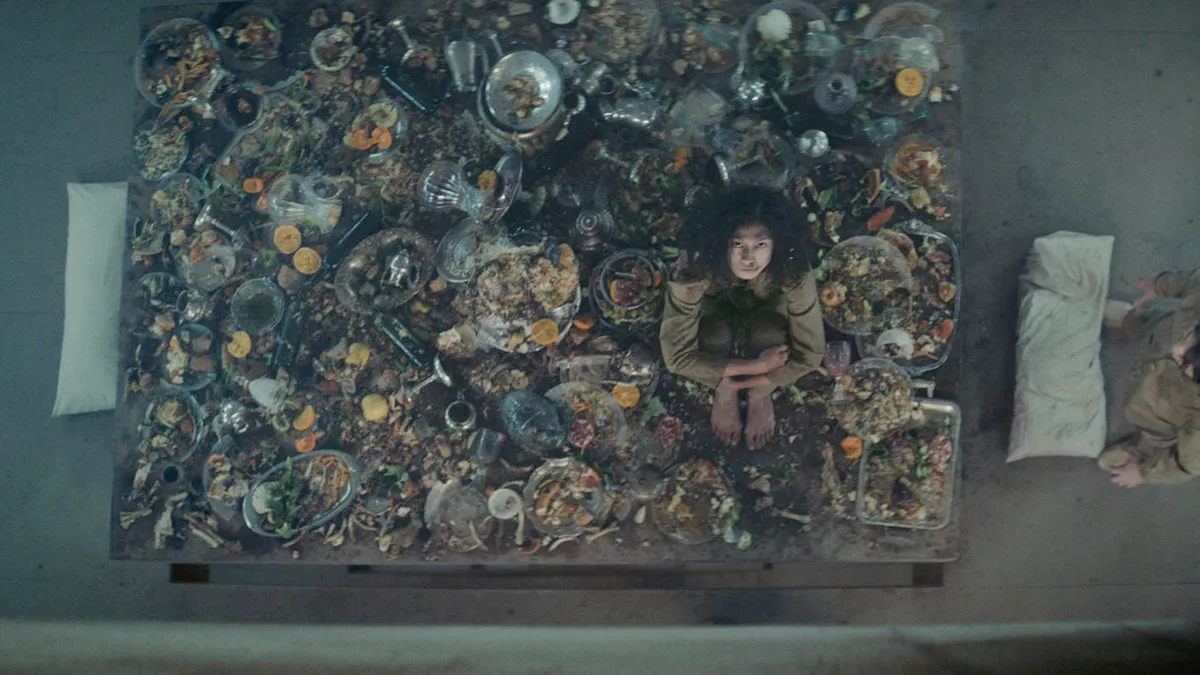Blog
More People Need to Watch the Most Disturbing Sci-Fi Movie on Netflix

Thank goodness I saw The Platform. I consider it frequently. But I’m not going to see it again, ever.
Watch the 2019 Spanish horror science fiction film The Platform on Netflix. I saw it, and it’s really good. I will, however, add that I won’t watch it again. Ever.
It’s among the most unsettling movies I’ve ever seen. I spent days reflecting about the movie and its nuanced significance after watching it. The Platform is so horrifying and disturbing that I’m happy to let the memory of it go. Although I’m delighted it exists, I’ll never have to sit down and watch it once more. This is why.
In a future prison with a vertical tower and an open hole in the center of each cell, The Platform is set. To feed the prisoners, a platform that is piled high with food falls through the cells. This is the film’s genius and terror.
The platform opens out with a wide variety of cuisines created by chefs. It barely briefly pauses at each cell floor, giving the two inmates there very little time to eat whatever they may find. However, they cannot just stuff the food into their cell to be eaten later because doing so will result in their death.
As a result, the convicts on the upper level receive unfinished meals, and as the platform descends, it becomes a jumble of partially consumed food and trash. If you know what I mean, and I think you do, the top-level convicts don’t try to keep The Platform clean because they don’t care what happens to the leftover food once it leaves them.
Each month, levels in the jail are randomly assigned to inmates, who are then moved to a different level. You have a good chance of acquiring some relatively unaltered food if you’re close to the top. If you’re at the bottom, you’re simply eating mutilated leftovers that have been spat out, if there are any edible remnants at all.
The Platform’s metaphor is clear.
The voice of a character murmurs, “There are three kinds of humans. “Those who rise to the top, those who sink to the bottom.”
Some people, frequently by pure luck or coincidence, wind up at the top of the heap, enjoying the best cuisine and leading relatively carefree lives. When I hear the phrase “born on third base, and think they hit a triple,” I think of the silver-spoon babies.
Others enter society at the bottom and, barring a lottery victory, are probably going to pass away before they advance. Moreover, they frequently do everything to advance.
Another group consists of people who begin life properly, eating well, and who are elevated to a position where food is abundant and untainted. The cakes and steaks they formerly ate are now simply dreams as they fall to a lower level. (Of course, some do ascend. But in The Platform, you’re very much screwed if you’re not at the very, very top.)
It could appear trite. You should seize the chances to enhance your situation, educate yourself, and feed yourself. Indeed, none of that is applicable in The Platform. You are either born there or placed there. You go up or down, and how far in each direction, is decided by a random draw. When you’re at the top, you take what you want without considering those who are doing worse, which is unfair.
As one character points out, if everyone in the prison just ate what they needed from The Platform, it would make its way down with enough food to feed everyone. But that’s unlikely to happen due to fear, greed, and the lingering memory of hunger.
You might believe that is sufficient for a plot on its own. Nonetheless, The Platform is full with countless surprises, the most of which I won’t reveal. Here are just a couple, none of which are actual spoilers because they take such absurd turns as to be unimaginable to anyone reading them here:
- In search of her daughter, a bleeding woman rides the platform down, but she soon realizes that each level has two convicts who are equally likely to try to kill her.
Each inmate is permitted to bring one object into the facility with them, and some of those items are peculiar. (The protagonist picks up a copy of Don Quixote.) They are never unimportant, just like Chekov’s pistol. - The inmates think there are 200 levels. “Belief” is stressed.
The information we believe we have regarding the inmates, the jail, and everything else in this film is far from accurate.
Now, I’m a Gen Xer who grew up watching slasher movies. I’ve watched scary movies. I’ve seen Human Centipede, Clockwork Orange, and Audition. (For that last one, I sincerely apologize.)
The Platform, however, is unique. Its social critique may come across as obvious: Show kindness to those who are below you since you never know when you’ll find yourself there. But despite having a relatively straightforward idea, screenwriters David Desola and Pedro Rivero and director Galder Gaztelu-Urrutia execute it in a paradigm-shifting manner.
The Platform is not something I want to see again. Yet occasionally I give it some thought. I’m still plagued by the plot, and I doubt I’ll ever be free of it entirely.
